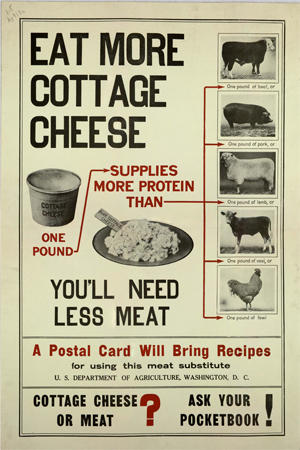To see how Cornucopia rates your favorite cottage cheese brand, access our mobile-friendly scorecard. More information is available in Cornucopia’s report, Weighing the Curds.
What is cottage cheese?
 Cottage cheese is made from the curds of cow’s milk, making a soft white cheese with a mild flavor. Unlike many other cheeses, it is not pressed or aged. Instead, it is drained so that it retains some of the whey (it was historically called curds and whey).
Cottage cheese is made from the curds of cow’s milk, making a soft white cheese with a mild flavor. Unlike many other cheeses, it is not pressed or aged. Instead, it is drained so that it retains some of the whey (it was historically called curds and whey).
The quality of cottage cheese is dependent on the quality of the milk it is derived from. Cornucopia’s research findings show that the best choice is always USDA certified organic cottage cheese, which consists almost entirely of the wholesome, highly nutritious ingredient from which it was derived: organic milk.
Recent changes to the cottage cheese marketplace
Although yogurt still dominates the market, cottage cheese has recently gained in popularity. Large companies are taking notice of this renewed interest and are playing with the standard “plain” formula.
Companies have started adding flavors and “mix-ins” of fruits and nuts to cottage cheese. Many also choose to process cottage cheese in a way to change its texture (introducing “smooth” or smaller curd varieties). Some brands of cottage cheese also have added fermented or live cultures, known as probiotics.
These additives can undercut cottage cheese’s healthy qualities with the addition of more sugar and processing aids.
Organic cottage cheese
How does organic cottage cheese differ from conventional cottage cheese? First, if an organic cottage cheese carries the organic seal, it means that the milk it is made from must come from organic certified cows who graze on certified organic pasture.
To learn more about the organic dairy marketplace, interested readers can check out Cornucopia’s compressive report on the industry: The Industrialization of Organic Dairy. Organic dairy brands—including those that carry cottage cheese products—are also rated on the Organic Dairy Scorecard. Consumers can use the dairy scorecard to find dairy brands that have high integrity and follow the letter and spirit of organic rules.
The dairy scorecard will also help consumers find where to buy organic cottage cheese in their area.
Are there health benefits in eating organic cottage cheese?
In the 1950s, cottage cheese was hailed as a diet and health food due to its high protein and low fat content. Its appeal waned as large-scale food manufacturers took industrial shortcuts in its production, which often altered the cottage cheese’s mild and familiar flavor.
Some fans of cottage cheese claim its nutritional content is good for weight loss.
Is cottage cheese nutritious?
Cottage cheese in its most authentic, organic form can be a nutritious food for those without dairy sensitivities or intolerances.
Fitness enthusiasts and athletes look to cottage cheese for its high content of casein protein. Casein is slow-digesting, which means it feeds cells over a long period of time, and is thought to reduce muscle breakdown.
Cottage cheese is high in dietary protein, which is essential for muscle growth and repair. One cup of cottage cheese can pack 25 grams of protein, which accounts for over 70% of the calories in cottage cheese.
For more information on the nutritional profile of cottage cheese, read Cornucopia’s Cottage Cheese Report: Weighing the Curds.
Is cottage cheese a probiotic food?
As with some yogurt, select cottage cheese producers add bacterial strains to replace those lost in processing. Some also add additional strains to increase the diversity of microbes in the food.
Which is the best cottage cheese?
The Cornucopia Institute always recommends organic cottage cheese over conventional cottage cheese. The primary reasons for this are:
- Organic dairy from truly pastured cows is more nutritious
- No added recombinant bovine growth hormone (rbGH)
- No genetically modified organisms or conventional pesticides
- No conventional pesticides used on fruit and other stir-in additives
Conventional cottage cheese that contains fruit and other mix-in additives, like nuts, could contain residues of synthetic, toxic pesticides that are not allowed in organic production.
Studies have shown that organically produced crops have fewer detectable pesticides, some of which mimic hormones in the body. Cumulative exposure to chemicals that mimic hormones in the body can have catastrophic effects on human health.
Ingredients to avoid in cottage cheese
Milk is the only ingredient that is required to make wholesome, nutritious cottage cheese. Some brands of cottage cheese are highly processed. Consumers should use caution when they say see a long ingredient list or ingredients they cannot identify.
- Carrageenan is problematic for many eaters and is now being added to some cottage cheeses to improve “mouth feel.”
- Added flavors and colors are often are added to improve the taste and appearance of products that have been highly processed.
- Added sugar in cottage cheese is another sign the product is highly processed and moving away from a health food. Sugar has also found its way into many flavored cottage cheese products. Consuming large quantities of sugar is unhealthy, and, if consumed in excess, can promote cardiovascular disease and type 2 diabetes.
- Non-organic emulsifiers and gums.
For more information about which brands contained limited added ingredients, check out Cornucopia’s Cottage Cheese Scorecard.

